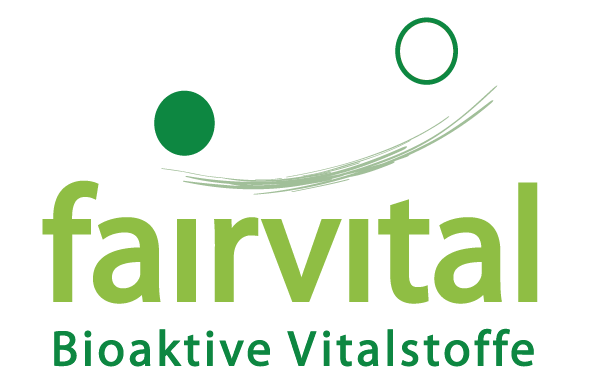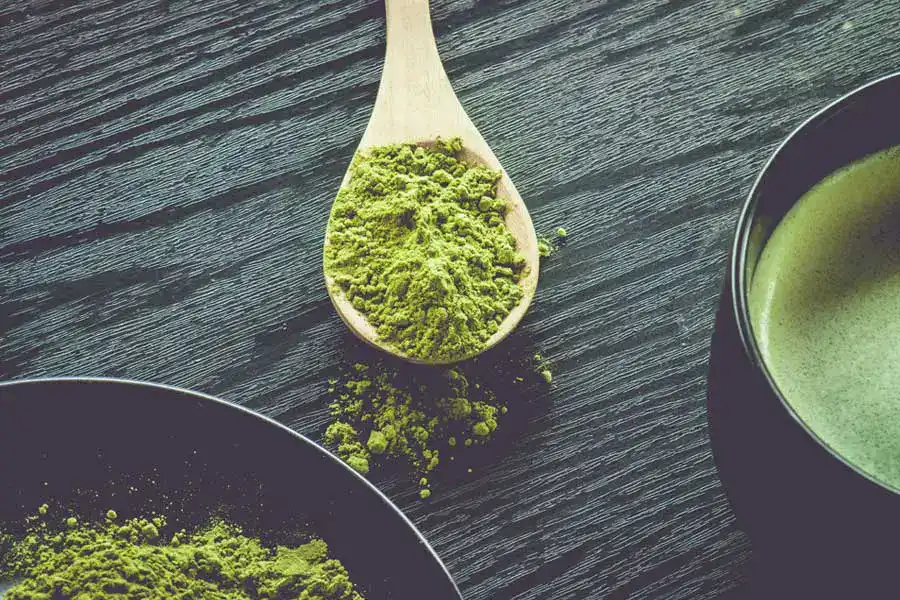Amino acids
In Fairvital you will find a wide range of amino acids. These include arginine, alanine, ornithine, leucine, isoleucine, valine, cysteine, tyrosine, histidine, tryptophan and many others. Of the 270 known amino acids, 20 are present in the human genome. These are called proteinogenic amino acids. We need these 20 amino acids to maintain the body's biological processes. But only eleven of these amino acids can be produced by the organism itself. The other nine must be obtained from the diet. They are essential. As building blocks of the body, amino acids are capable of forming body tissues such as organs, muscles, skin and hair.
Filter products
- Vital substances
-
Applications
- Anti-Aging
- Eyes
- Ayurveda & TCM
- Beauty
- Blood sugar level
- Intestine & Stomach
- Energy
- Detoxification
- Memory & Psyche
- Joints
- Tissue Health
- Weight loss
- Hair
- Hands & Feet
- Heart & Vessels
- Immune system
- Bones
- Liver
- Passion
- Lungs
- pH-Value
- Men's health, bladder and kidneys
- Pregnancy
- Sports
- Vegan & Vegetarian
- Digestive system
- Menopause
- Mind & Sleep
- Nervensystem
- A-Z
- Sets
- Vitalexikon
- Top & New
- Gummies
- Pets
- Offers & Vouchers
- Catalogues & Literature
- Fairvital Blog
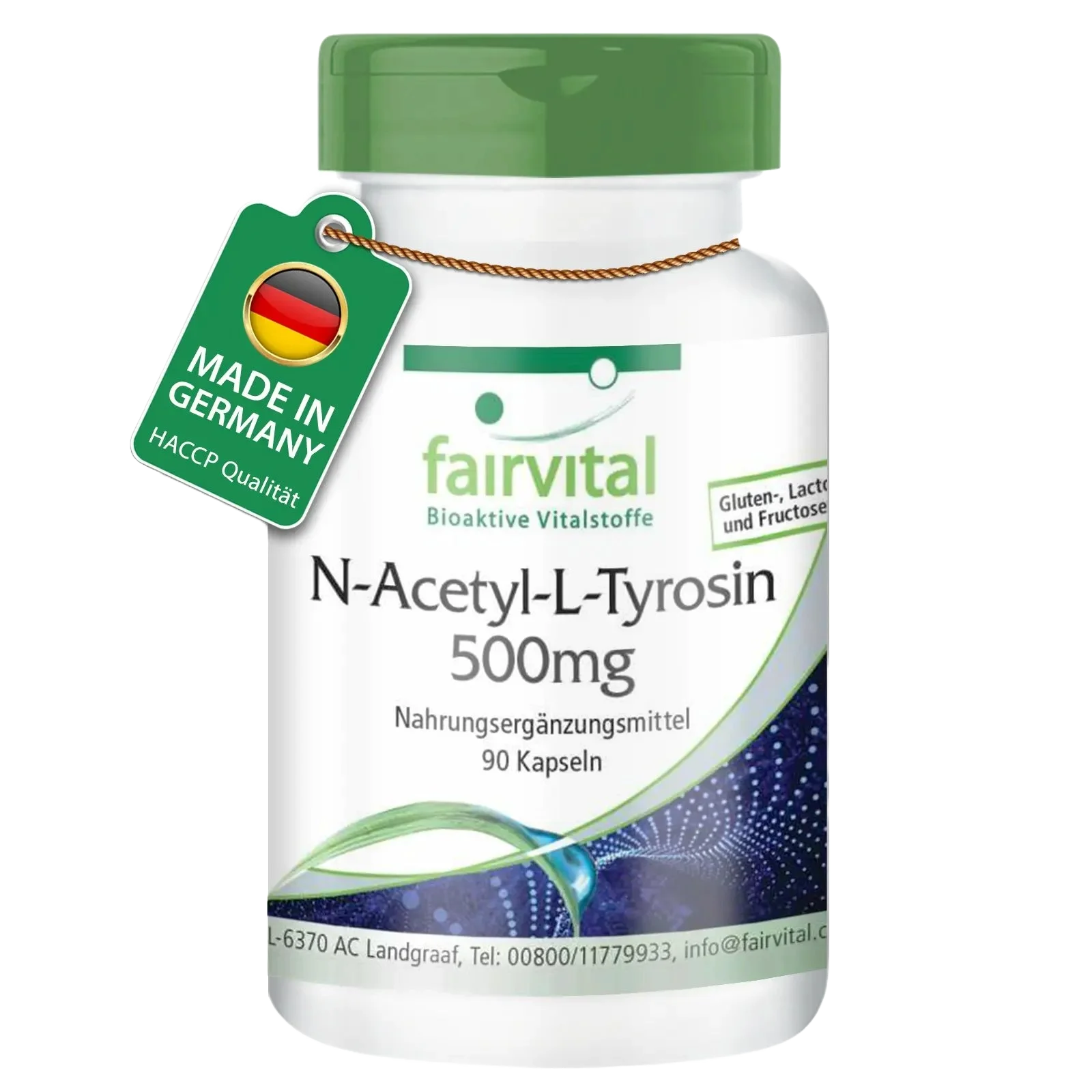
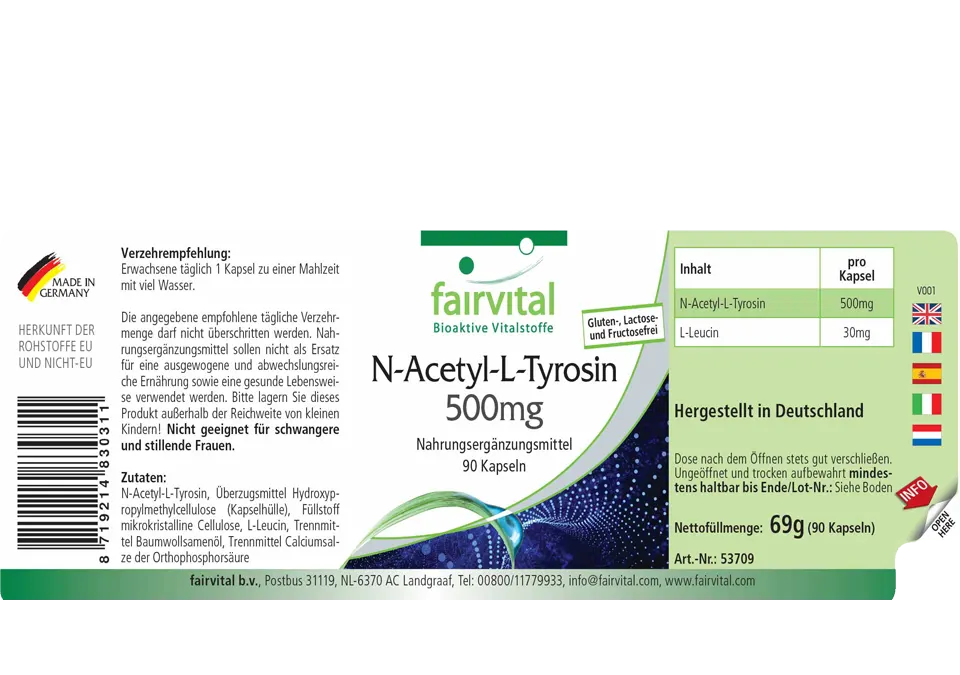
What is N-Acetyl-L-Tyrosine (NALT)? N-Acetyl-L-Tyrosine is an advanced form of the non-essential amino acid L-Tyrosine. L-tyrosine is contained in many proteins and is involved in the production of messenger substances such as thyroxine or dopamine in the human body. The human body can synthesize tyrosine itself from the essential amino acid phenylalanine. The acetylated form of L-tyrosine is N-acetyl-L-tyrosine (NALT). Acetylated means that, chemically speaking, a so-called acetyl group has been incorporated. The acetyl group ensures prime bioavailability and usability of the amino acid. N-Acetyl-L-Tyrosine dosage Fairvital recommends one capsule with 500 mg N-acetyl-L-tyrosine per day as a dietary supplement. Since NALT can be absorbed much better by the body, a lower dosage is required than with conventional L-tyrosine. If there is an increased need for L-tyrosine, the daily consumption can be easily adjusted due to the capsule shape. Order N-Acetyl-L-Tyrosine capsules from Fairvital: evolved form of L-Tyrosine proteinogenic amino acid highly dosed with 500mg NALT per capsule Big pack for 3 months without magnesium stearate and silicon dioxide
Content: 0.069 kg (€187.68 / 1 kg)
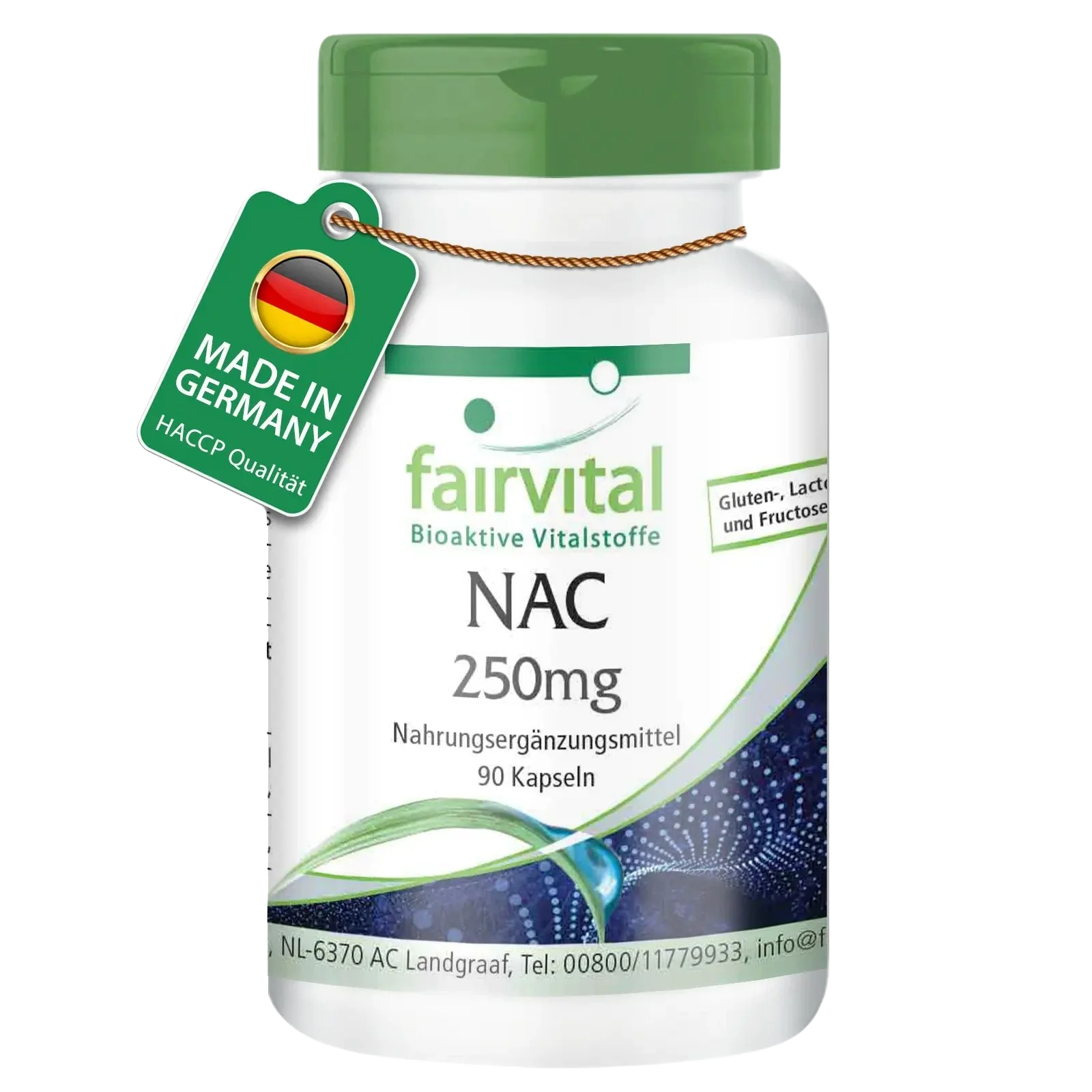
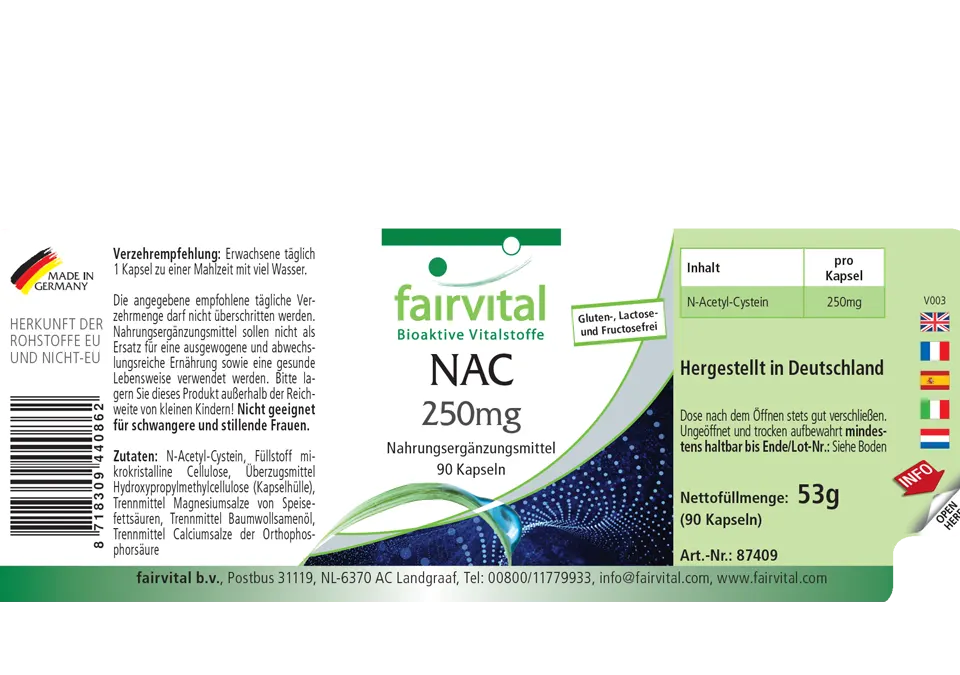
Average rating of 5 out of 5 stars
N-acetyl-cysteine: special amino acid NAC is a form of the amino acid cysteine that can be used particularly well. It is a bioactive antioxidant that promotes the formation of reduced glutathione. Antioxidants in the body Antioxidants are compounds that can protect body cells from the damaging effects of free radicals. Free radicals are formed in all metabolic processes (e.g. energy metabolism or respiration) as well as through external influences such as smoking, environmental toxins or ozone pollution. NAC by Fairvital easily usable due to acetyl form highly dosed with 250mg NAC per capsule Component of glutathione vegetarian and vegan gluten-free, lactose-free, fructose-free without silicon dioxide
Content: 0.053 kg (€319.81 / 1 kg)
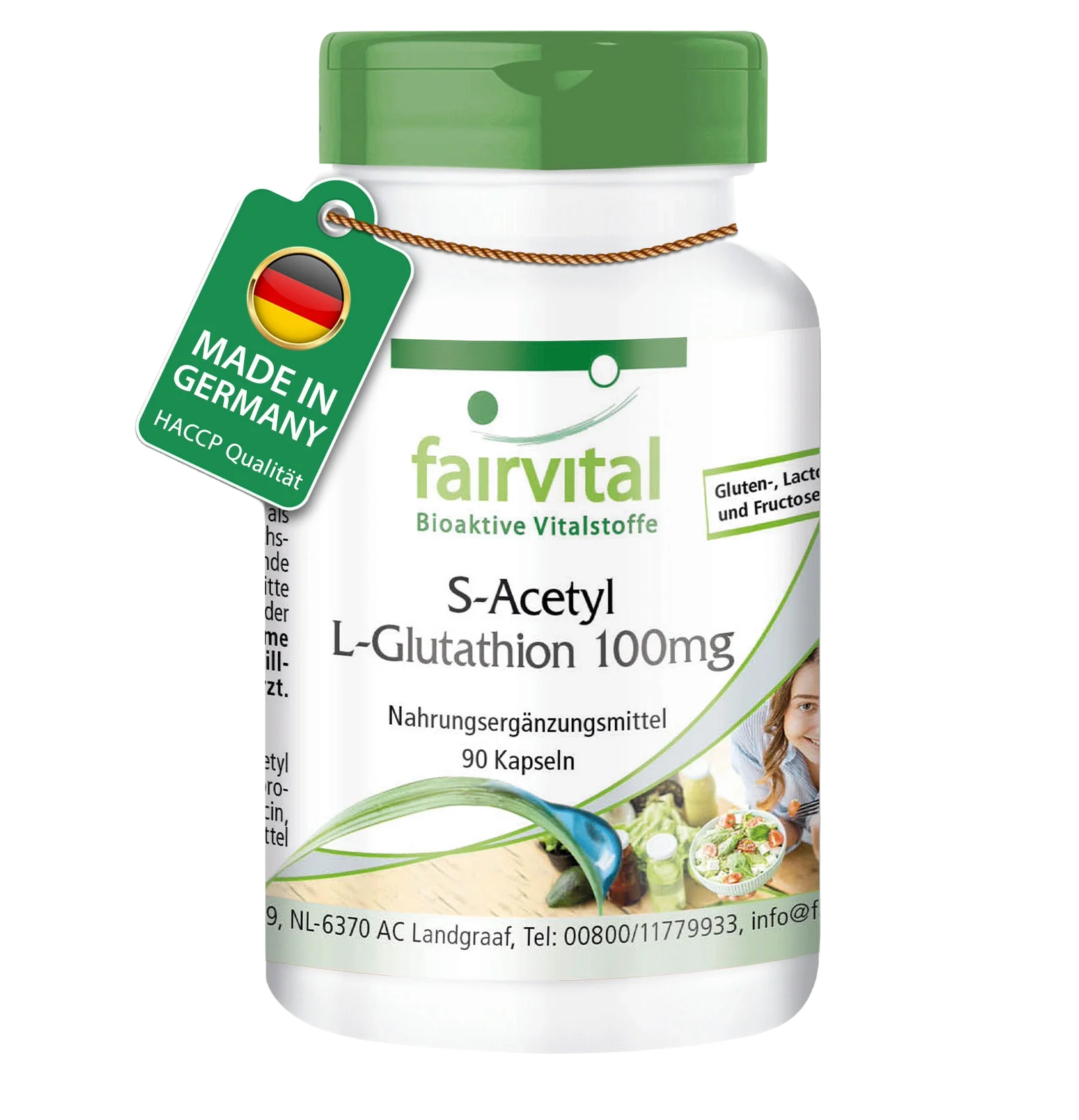
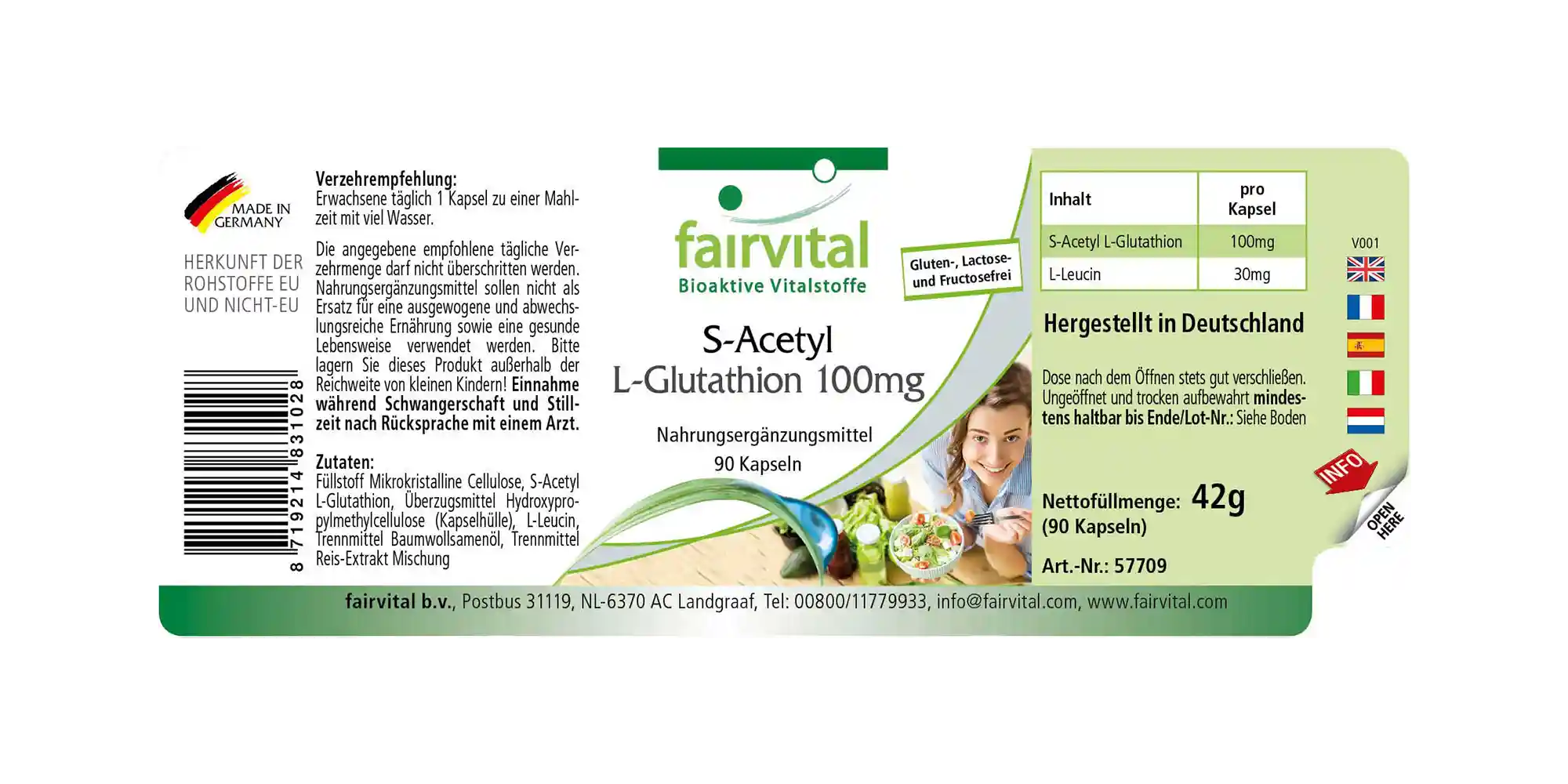
S-Acetyl L-Glutathione: Stable form of glutathione with high bioavailability.S-Acetyl-L-Glutathione is more stable than normal L-Glutathione. While normal L-glutathione is absorbed into the body with difficulty, S-acetyl-L-glutathione is quickly and completely absorbed into the cells.Forms of glutathioneThere are three forms of glutathione: the reduced form, the oxidized form and S-acetyl-L-glutathione. Most dietary supplements containing L-glutathione contain the reduced form. Scientists have described that the S-acetyl form of glutathione has high bioavailability. It is more stable than the reduced form and is not oxidized in the gastrointestinal tract.What is S-acetyl-L-glutathione?Glutathione is an important sulfur compound for the human organism. It is produced in our body from the amino acids cysteine, glutamine and glycine. S-acetylglutathione is acetylated glutathione. The coupling of an acetyl group to a glutathione molecule favors efficient uptake into cells. In the formation of complex amino acid molecules, the acetyl group serves to protect against oxidation. Once inside the cell, enzymes can rapidly break down and process the S-acetyl-L-glutathione compound so that it can be rapidly absorbed by the body.S-Acetyl L-Glutathione Capsules from Fairvital:100 mg S-acetyl-L-glutathione per capsulestable form of glutathionehigh bioavailabilityhandy package for 90 daysvegetarian and vegangluten-free, lactose-free, fructose-freewithout magnesium stearate and silicon dioxide
Content: 0.03 kg (€981.67 / 1 kg)
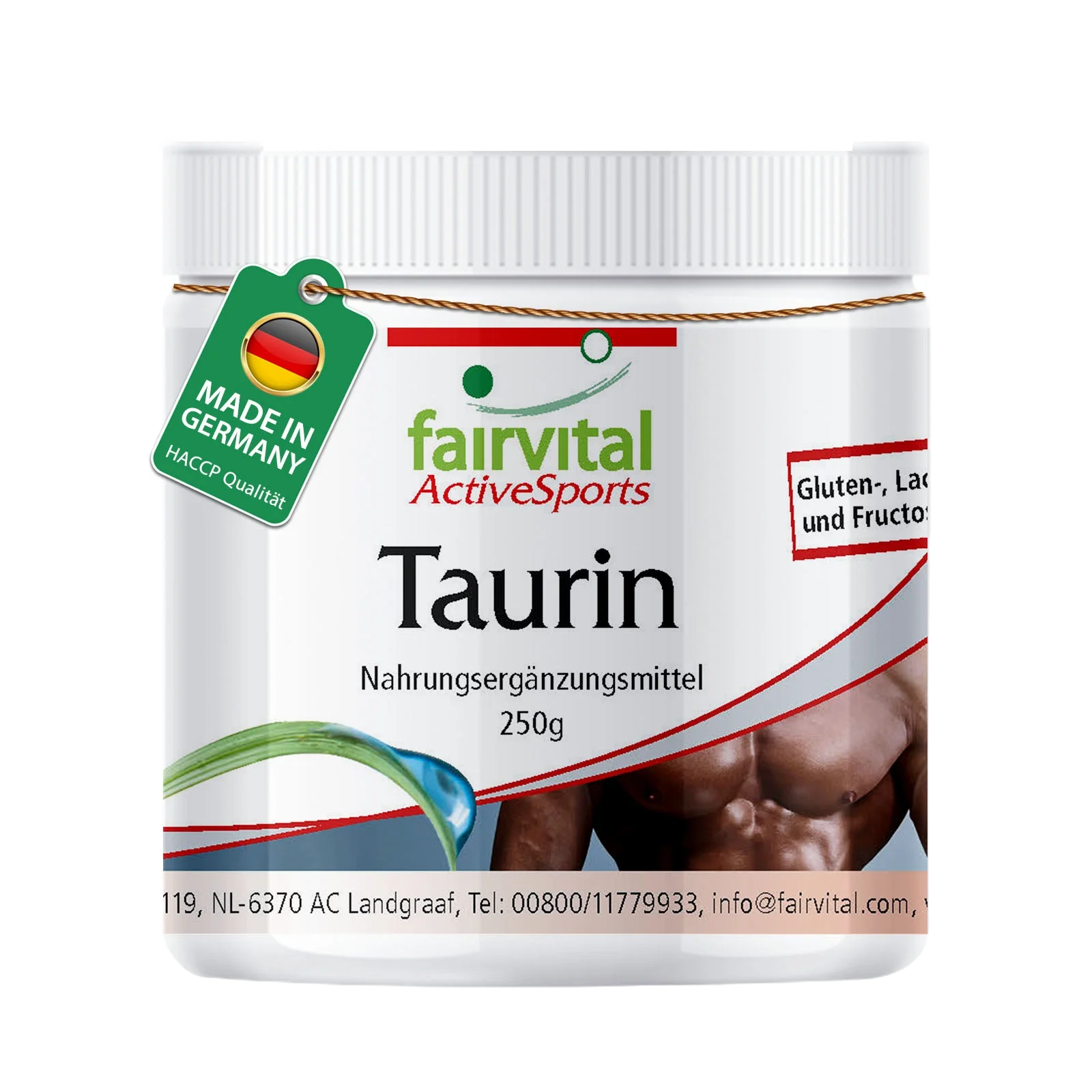

High-dose taurine with vitamins If you are looking for a high-quality taurine powder, Fairvital is the right choice for you! This food supplement provides you with 1600mg of taurine, 50mg of thiamine (vitamin B1) and 50mg of pantothenic acid (vitamin B5) per daily dose. The practical measuring spoon, with which you can easily measure the powder, is included with the product. Taurine is no ordinary amino acid Contrary to what is often read on the internet, the name taurine does not come from the fact that it is extracted from bull urine. Rather, it was discovered in 1827 in ox bile and isolated from it. The name thus comes from the Latin word for bull bile (Fel tauri) and from the Greek tauros for bull. The known proteinogenic amino acids are so-called amino carboxylic acids that are able to form proteins. Taurine, on the other hand, is an aminosulphonic acid - a sulphuric acid with an amino group that cannot form proteins. The human organism is capable of producing taurine itself, namely from the amino acid cysteine. However, in case of an increased need or a low-protein diet, it makes sense to take in more taurine through food or to use food supplements. Vegetarians and vegans can also benefit from a taurine intake, as plant foods only contain small amounts of taurine. Good sources of taurine, on the other hand, are fish, pork, lamb, beef and poultry. Thiamine for the heart Thiamine, also known as vitamin B1, is one of the water-soluble B vitamins that must be supplied to the body in sufficient quantities every day. Like almost all B vitamins, thiamine plays an important role in the body's energy metabolism and ensures that the essential macronutrients (carbohydrates, fat and protein) can be optimally utilised. In addition, thiamine is involved in the formation of red blood cells and supports the protection of cells against oxidative stress, an excess of free radicals. However, the most interesting function of thiamine is that it is needed in the nervous system and that a vitamin B1 deficiency can lead to the disease beriberi. Beriberi mainly manifests itself in disorders of the nerves, muscles and cardiovascular system. For this reason, an adequate supply helps the heart to maintain its normal function. In the context of the nervous system, B1 also supports the function of the psyche and ensures a balanced mental state. Vitamin B5 for mental performance Mental performance or mental efficiency includes various functions that affect the brain: intelligence and cognitive abilities such as thinking, perception, memory, retentiveness and learning ability. An adequate intake of vitamin B5 can support mental performance. In addition, pantothenic acid is responsible for the synthesis and metabolism of various endogenous substances: some neurotransmitters, vitamin D and steroid hormones. B5-dependent neurotransmitters include acetylcholine and serotonin; steroid hormones include cortisol, sex hormones and DHEA. Another interesting steroid hormone is calcitriol, the active form of vitamin D3, in the conversion of which vitamin B5 is also involved. Furthermore, pantothenic acid plays an important role in the energy metabolism of the organism and can help to reduce tiredness and fatigue. Powdered taurine with vitamin B1 and B5 highly dosed 1600mg taurine per daily intake 50mg B1 and 50mg B5 per daily intake supports the heart function promotes mental performance contributes to cell protection tip for vegetarians and vegans contains a practical measuring spoon easy to dose vegetarian and vegan gluten-free, lactose-free, fructose-free pure substances without magnesium stearate and silicon dioxide
Content: 0.323 kg (€43.19 / 1 kg)
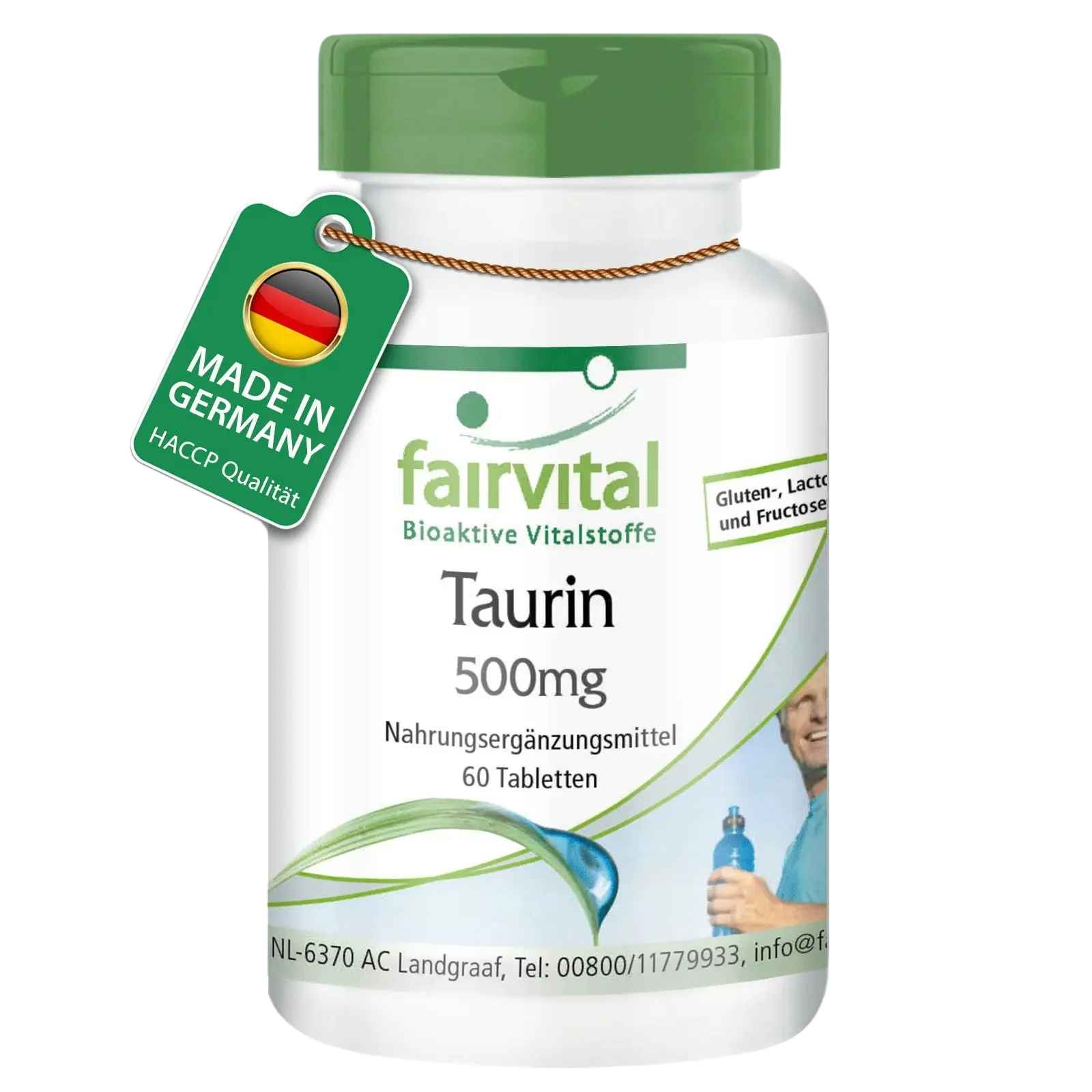
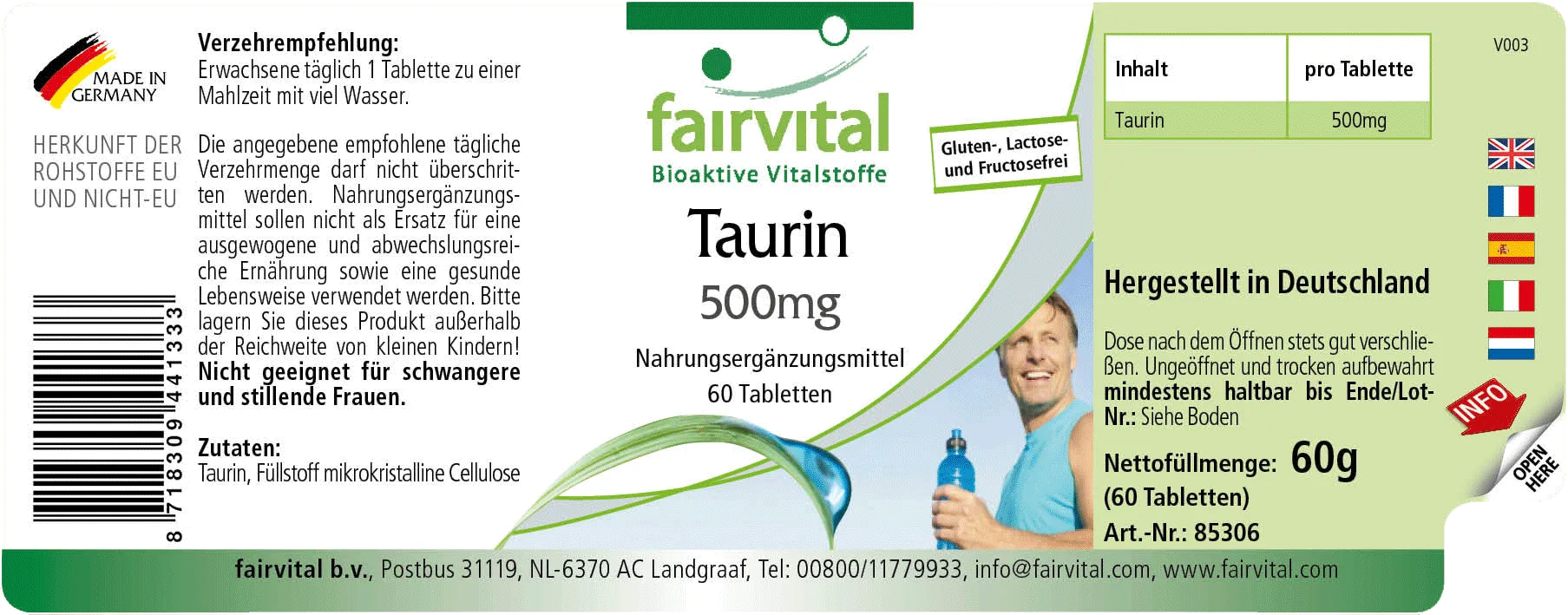
Average rating of 4.8 out of 5 stars
Taurine tablets Fairvital's dietary supplement contains high-dose taurine with 500mg per tablet. Since taurine is naturally found primarily in meat, fish, seafood, eggs and dairy products, this product is particularly recommended for vegetarians and vegans. Taurine is primarily known as an ingredient in the so-called energy drinks. Taurine in the human organism Taurine (also called aminosulfonic acid) is not an amino acid in the traditional sense, even if it is often mistakenly counted as one of them. Chemically, taurine is an organic acid with a sulfonic acid group and an amino group attached to it. The body is able to manufacture taurine itself. More precisely, the vital substance is created when the amino acid cysteine is broken down. On average, this produces 125mg daily. Taurine is found throughout the body, but the greatest amounts of are found in the blood, brain, heart, eyes and muscles. Taurine extraction Taurine was isolated from ox bile by Leopold Gmelin and Friedrich Tiedemann in 1827 and called gall asparagine. At that time, chemists were working on investigating the processes involved in the digestion of cattle. The term “taurine” therefore comes from the Latin term for bull bile, fel tauri, or from the Greek word tauros for “bull “ and is first mentioned in literature in 1838. Today, taurine is synthetically produced so that vegetarians and vegans can safely take it. Buy taurine at Fairvital highly dosed 500mg taurine per tablet Tip for vegetarians and vegans vegetarian and vegan gluten-free, lactose-free, fructose-free without magnesium stearate and silicon dioxide
Content: 0.06 kg (€240.83 / 1 kg)
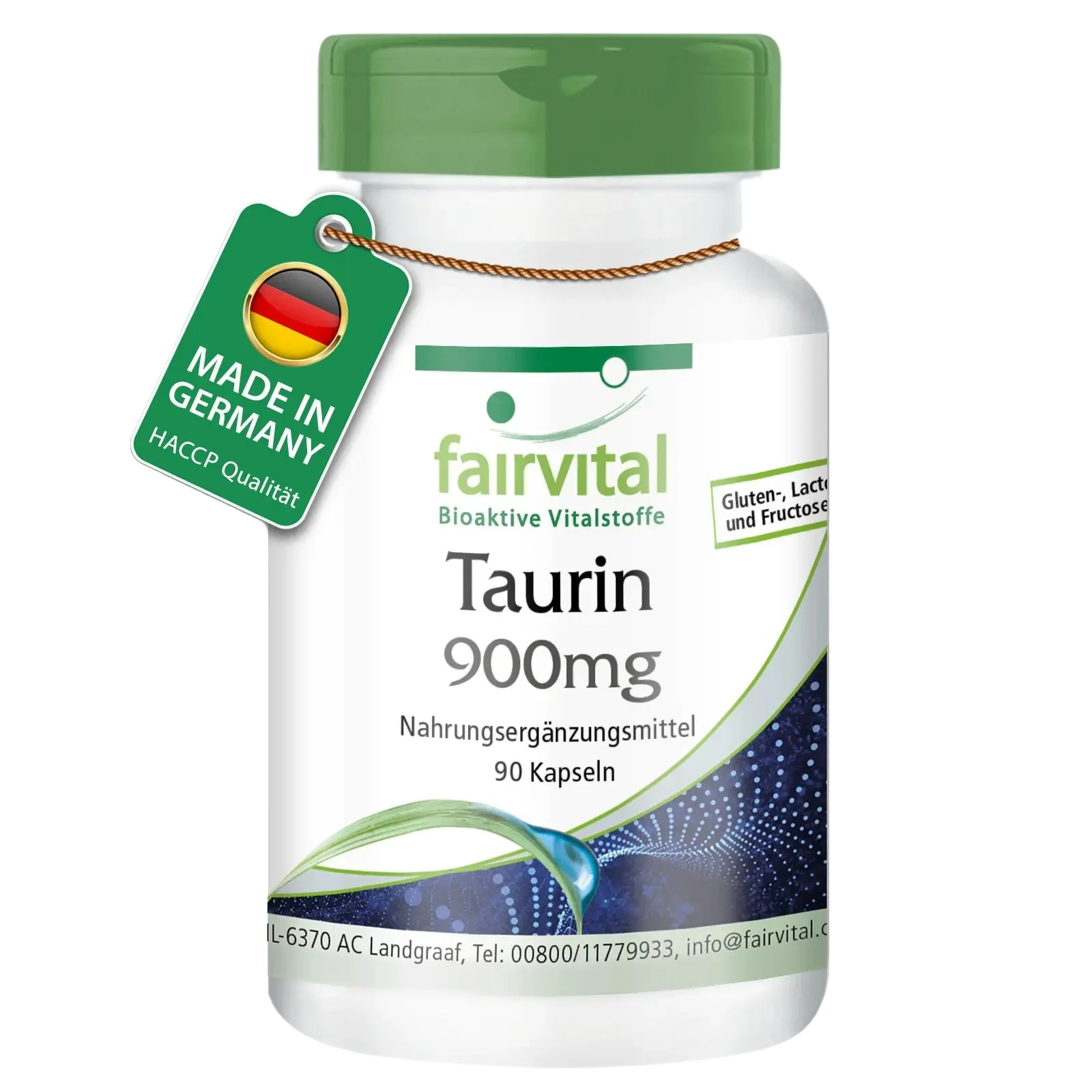
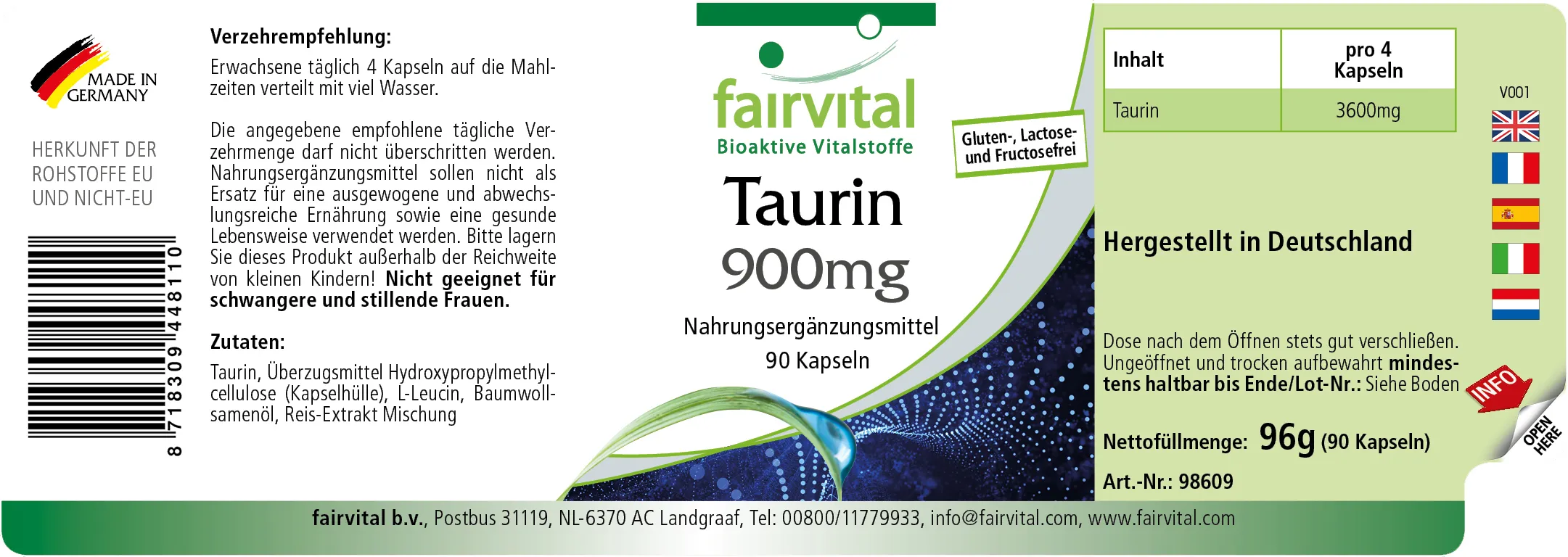
Taurine: sensible dietary supplement Taurine is often assigned to the non-proteinogenic and sulphurous amino acids that occur naturally both in the daily diet and in the human body. Non-proteinogenic means that, unlike other amino acids, it is not incorporated into proteins. Taurine is made by the body itself when the amino acid cysteine is broken down. However, the human organism can synthesize it relatively poorly. Only around 50 to 125mg are produced daily. Taurine occurs freely (unbound) in cells. Between 30 and 70g of taurine are found in the body of a person weighing around 70kg. It is found in high concentrations in the muscles, brain, heart and blood. Taurine was isolated from ox bile by Leopold Gmelin and Friedrich Tiedemann in 1827 and called gall asparagine. At that time, chemists were working on investigating the processes in the digestive process of cattle. The term "taurine" comes from the Latin word for bull bile, Fel tauri, or from the Greek word tauros for "bull" and was first mentioned in literature in 1838. Occurrence of taurine in food Good sources of taurine are shrimp (260mg/100g), tuna (70mg/100g), pork tenderloin (50mg/100g), lamb tenderloin (47mg/100g), beef tenderloin (36mg/100g), chicken (34mg/100g), liver ( 30mg/100g) and milk (6mg/100g). Since taurine is mainly found in animal foods, a dietary supplement with this amino acid can make sense for vegetarians and vegans. Taurine capsules from Fairvital highly dosed with 900mg per capsule Tip for vegetarians and vegans vegetarian and vegan gluten-free, lactose-free, fructose-free without magnesium stearate and silicon dioxide
Content: 0.096 kg (€176.56 / 1 kg)
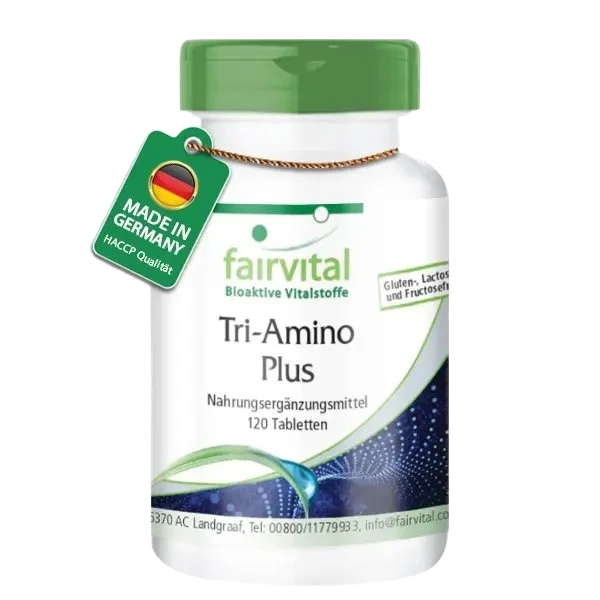

Arginine, ornithine and lysine with calcium and magnesiumFairvital Tri-Amino Plus is a safely dosed food supplement, in which the amino acids L-arginine, L-ornithine and L-lysine and the minerals calcium and magnesium have been combined. Per daily consumption of 4 tablets are 200 mg L-arginine HCl, 136 mg L-ornithine HCl, 1500 mg L-lysine HCl, 320 mg calcium and 200 mg magnesium.Proteinogenic amino acidsThe amino acids L-arginine and L-lysine are proteinogenic amino acids. Proteinogenic (protein-forming) amino acids are building blocks of body proteins. They are necessary for building the proteins as well as the muscles in the body.L-ArginineThe semi-essential, proteinogenic amino acid L-arginine is the main component of collagen (fibrous protein) and elastin, the (elastic) fibers of connective tissue, skin and tendons. Arginine is also found in cartilage, bones and the teeth. From L-arginine, together with glycine and methionine, the substance creatine, one of the energy-rich compounds of the muscles, is produced. L-lysineL-lysine is an essential proteinogenic amino acid that plays an important role in the maintenance and formation of new tissue. Just like arginine, lysine is involved in the synthesis of collagen and elastin. This amino acid is also a building block for the formation of the body's own L-carnitine.L-ornithineL-ornithine, like arginine, plays an important role in the urea cycle. Both amino acids can be easily converted into each other in the body. L-ornithine is found in many plants. This amino acid is not itself a protein building block. It is non-proteinogenic. Minerals calcium and magnesiumThis amino acid formula is the combination of minerals, calcium and magnesium. Both micronutrients contribute: to normal muscle function normal communication between nerve cellsnormal energy metabolismto the maintenance of normal bones and teethnormal blood clottingThe minerals calcium and magnesium also have a function in cell division. Magnesium also helps reduce fatigue and is involved in the electrolyte balance in the body. For athletes it is important to know that magnesium has a function in protein synthesis in the body. Order Tri-Amino Plus from FairvitalAmino acid complex with mineralsfor energy metabolismfor normal muscle functioninvolved in the body's own protein synthesisproteinogenic amino acids with calcium and magnesium package for 30 dayssafe dosagewithout magnesium stearate and silicon dioxide
Content: 0.128 kg (€97.27 / 1 kg)
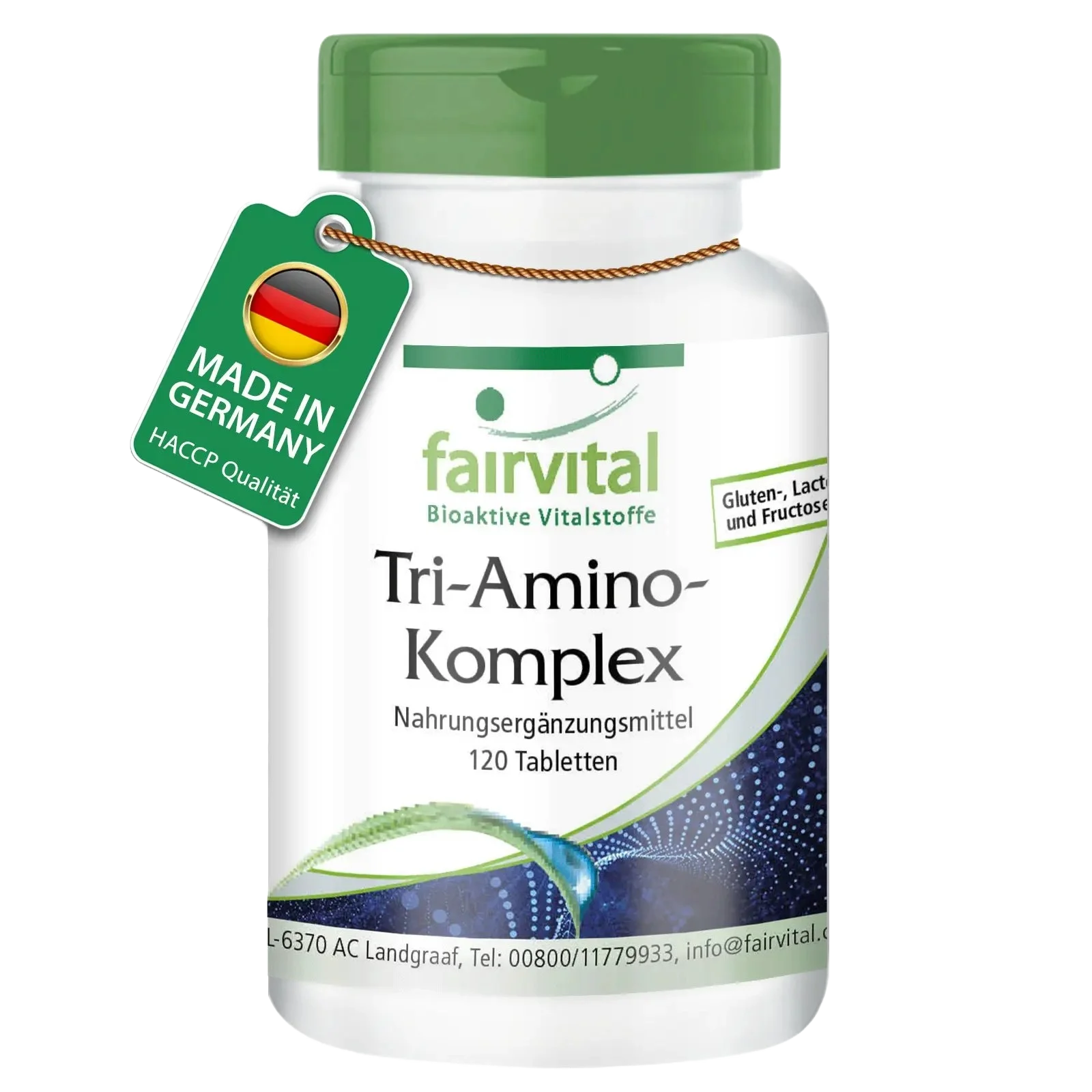
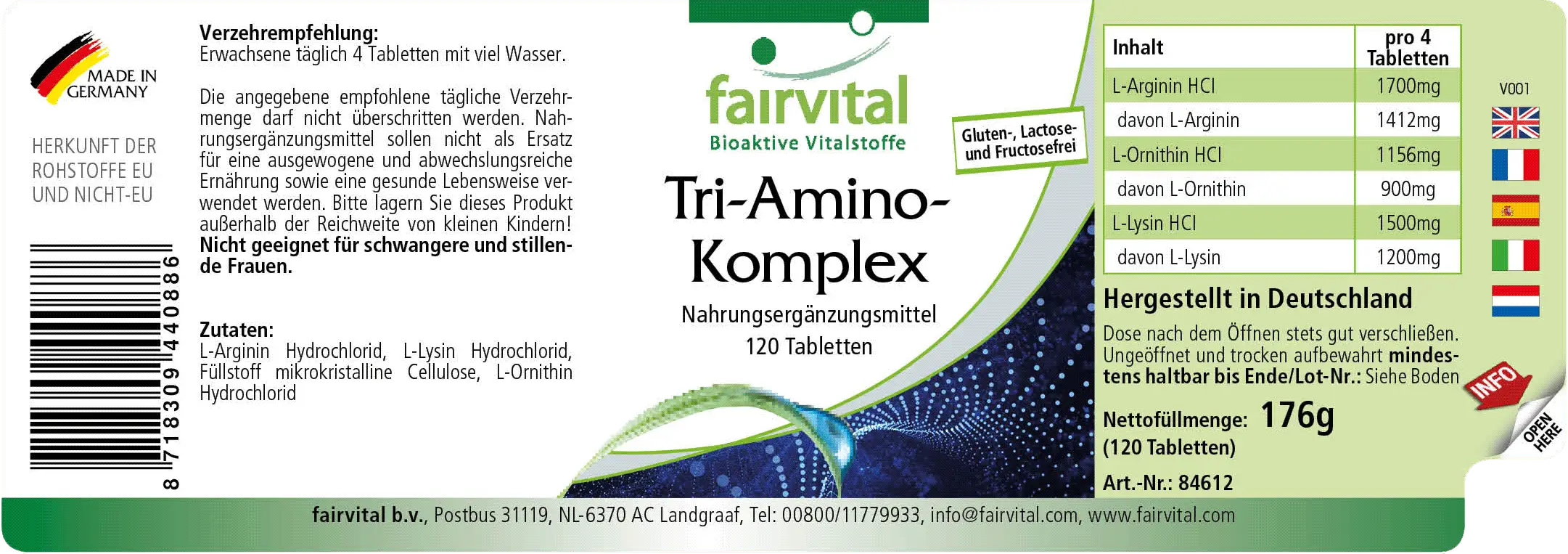
Average rating of 4.6 out of 5 stars
Tri-amino complex: arginine, lysine and ornithine L-arginine, L-ornithine and L-lysine have various tasks in the human metabolism, which is why we have combined the three amino acids and offer them as a dietary supplement. Essential amino acids The essential amino acids are those that are required by the organism, but which it cannot produce itself. The essential amino acids include lysine, leucine, isoleucine , methionine, threonine, phenylalanine, tryptophan and valine. In addition to the essential amino acids, there are also semi-essential amino acids that the organism can manufacture itself. However, these occur in such small amounts that the body is dependent on an additional supply through food. These include: arginine, glycine, ornithine and citrulline. Proteinogenic and non-proteinogenic amino acids Moreover, amino acids are divided according to whether they can be used by the organism to produce proteins or not. The proteinogenic amino acids include, for example, arginine, cysteine, glutamine, glycine and histidine , leucine, methionine, proline, tryptophan and tyrosine. Theanine, ornithine, citrulline, GABA and thyroxine belong to the group of non-proteinogenic amino acids. Role of L-arginine The semi-essential, proteinogenic amino acid L-arginine is the main component of collagen (fiber protein) and elastin, the (elastic) fibers of connective tissue, skin and tendons. It is also found in cartilage, bones and teeth. The blood vessels also consist mainly of collagen and elastin. The substance creatine, one of the energy-rich compounds in the muscles, is produced from L-arginine together with glycine and methionine. L-arginine serves the body as a supplier of nitrogen, as it has the highest proportion of nitrogen (N) of all amino acids. In the organism, N is converted into nitrogen monoxide (NO), which is an important messenger substance in the human body. L-lysine: building block of collagen L-lysine is an essential, proteinogenic amino acid and thus plays an important role in the maintenance and regeneration of tissue and, like arginine, is involved in the synthesis of collagen and elastin. This amino acid is also the building block for the formation of endogenous L-carnitine. L-Ornithine L-Ornithine, like arginine, plays an important role in the urea cycle and the two amino acids can easily be converted into each other in the body. L-ornithine is freely contained in many plants. This amino acid itself is not a protein building block (non-proteinogenic). Amino acid complex from Fairvital useful combination of arginine, lysine and ornithine Involved in collagen and elastin synthesis vegetarian and vegan gluten-free, lactose-free, fructose-free without magnesium stearate and silicon dioxide
Content: 0.176 kg (€144.60 / 1 kg)


Average rating of 5 out of 5 stars
Whey - whey protein without additives Whey is the English term for whey protein, which makes up about 20% of the proteins in milk. Whey is a by-product of cheese making and is the liquid pressed out of curds of milk. Whey protein is rich in amino acids and contains the 8 essential amino acids L- Isoleucine, L-Leucine, L-Lysine, L-Methionine, L-Phenylalanine, L-Threonine, L-Tryptophan and L-Valine. In addition, whey contains a high percentage of BCAA (leucine, isoleucine and valine). Biological value 140 This whey protein has a high biological value of 140. The higher this is, the better the protein can be converted into endogenous protein. Whole egg with a biological value of 100 is used as a reference value. The biological value depends on how similar the amino acid profile of the dietary proteins is to that of the body proteins. Due to the high proportion of essential amino acids, whey can be absorbed and utilized by the body very quickly and effectively. Protein is very important for our organism In addition to carbohydrates and fat, protein is one of the macronutrients. It is made up of amino acids and is found in every cell in the organism. It's not just our musculature that needs protein every day, but also our immune system (e.g. antibodies and immunoglobulins). Furthermore, proteins in the form of enzymes are essential for our metabolism and other functions. Proteins also play an important role in blood clotting, cell membranes and as an energy supplier.< br> The German Society for Nutrition recommends 1 - 0.8g protein per kg body weight daily, whereby the recommended intake is age-dependent. Growing children need more protein than young adults. Older people, i.e. seniors, in turn, require more protein than younger people. Pregnant and breastfeeding women also depend on a higher protein intake. Whey in bodybuilding Whey is particularly interesting for athletes because it contains a high proportion of the branched-chain amino acids L-leucine, L-valine and L-isoleucine, which are also known under the name BCAA (engl.: branched- chain amino acids) are known. BCAAs contribute to muscle building and serve as an energy source for the metabolism. Whey 140 whey protein from Fairvital high biological value easily absorbable protein high percentage of BCAA ideal for athletes contributes to muscle building no added sugar with natural vanilla aroma gluten free, fructose free without magnesium stearate and silicon dioxide
